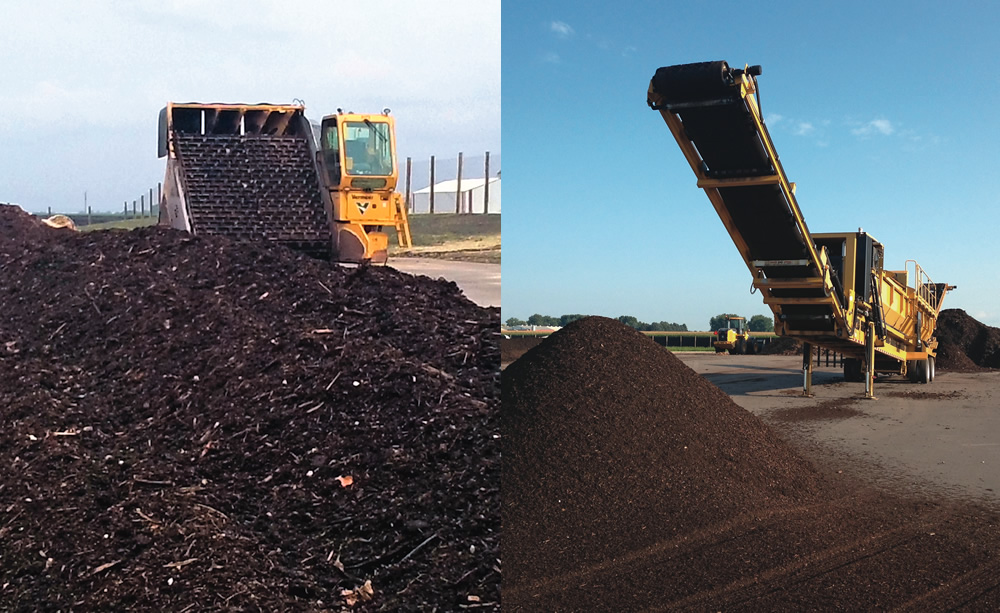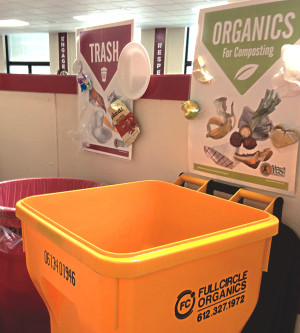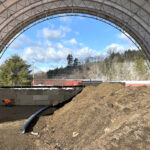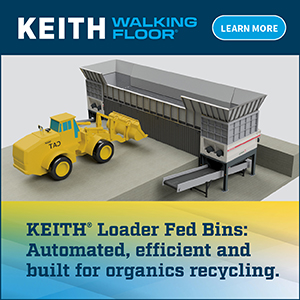Full Circle Organics establishes cooperative agreements with local landowners to open and manage source separated organics composting facilities in the Midwest.
Dan Emerson
BioCycle November 2013
Minneapolis, Minnesota-based entrepreneur Max Milinkovich used his business experience and training in the waste management industry to launch Full Circle Organics, LLC, a composting venture that has opened five facilities since September 2012. Milinkovich worked for Connecticut-based Oakleaf, running Minneapolis-based Target Corp.’s resource recovery program, and for Houston-based Waste Management before that. Hearing his corporate clients lament the lack of viable options for organic waste recycling inspired him to launch his company in 2010.
Milinkovich wrote a business plan for the company as part of his MBA thesis at Keller Graduate School of Management, a process which involved researching the composting industry and networking with those in the field. To start the company, Milinkovich raised about $700,000 in capital with family loans and bank financing in order to begin the permitting process (and before one scoop of dirt was moved). He then began seeking out potential partners interested in establishing cooperative agreements to operate facilities. “The mission of Full Circle Organics is to successfully manage a cooperative of composting facilities in multiple locations that process source separated organics (SSO),” explains Milinkovich. “Each of our member partners is a private company. We provide them with the ability to build successful composting sites using our expertise and permitting abilities.”
The Co-op members own the land of the respective composting site and operate the facility on a day-to-day basis. There is a loader and turner stationed at each site. The grinder and screener, owned by Full Circle Organics, travel from site to site (about 250 miles) on an as needed basis. In January 2013, its first SSO composting facility opened in Farley, Iowa, with Midwest Organic Solutions of Dubuque, Iowa as the local co-op member. A second site opened in February near Good Thunder, Minnesota with MFS Farms as the local co-op member.
The third SSO facility near Becker, Minnesota is expected to be fully open by December 1; currently, it is only accepting yard debris, brush, logs, stumps and clean wood. The 200-tons/day composting facility is located on 15 acres leased from the Vocno II landfill. In addition, Full Circle Organics operates yard trimmings composting sites in Shakopee and St. Cloud, Minnesota. The co-op member in St. Cloud is Tri-County Organics, which is constructing a SSO Composting Demonstration Project through the Minnesota Pollution Control Agency; it will be accepting SSO starting on December 1. The composting operation in Shakopee was just permitted in July 2013. This campus is already establishing successful relationships with local haulers.
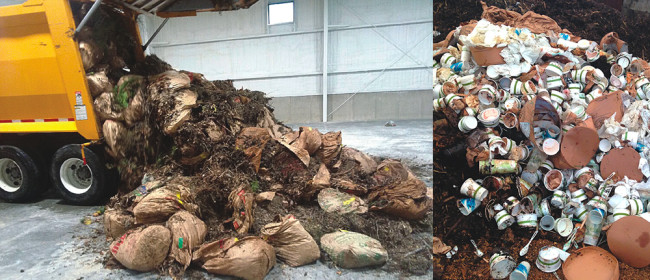
Full Circle Organics has a contract with the City of Dubuque to compost commingled residential organics (left), including food waste, at its composting facility in Farley, Iowa that it operates with Midwest Organic Solutions. The Good Thunder facility is processing the SSO from the schools in Mankato (right).
Farley, Iowa
The approximately 12-acre site in Farley has the capacity to process about 90 tons/day of source separated organics, and is currently receiving about 10 to 25 tons/day. About 25 percent of incoming feedstock is food waste, with the remainder green waste and clean wood and drywall. One of the major sources is Progressive Packaging in Dubuque, which provides four to six tons of food and paper material every other day. Midwest Organic Solutions is also permitted to accept animal bedding with up to 40 percent manure.
Full Circle Organics has also entered into a contract with the City of Dubuque to receive commingled yard debris and food scraps from households, a number of commercial businesses and many elementary and high schools and colleges within the city. Dubuque has been doing residential curbside collection of commingled organics for more than seven years, but due to permitting regulations, the city couldn’t expand its organics program because of tonnage limits at its composting site, explains Milinkovich. Therefore commingled collection was only available for about 200 participants. Because of the contract with Full Circle Organics, all Dubuque residents now are able to take advantage of the program. Farley is located 18 miles west of downtown Dubuque.
The site has a 100- by 120-foot steel building and a 3-acre composting pad made of compacted clay combined with a mixture of concrete and gravel. Windrows are typically 6- to 9-feet high and 12-feet in width. Compost is turned using a Vermeer 670 elevated-face turner. The operation has one full time and two part-time employees. Finished compost is sold to area landscapers and residents. “I also anticipate demand for compost will increase along with the growing popularity of community gardens in the Dubuque area,” notes Milinkovich.
Good Thunder, Minnesota
For his first Minnesota composting site, Milinkovich chose Blue Earth County in southern Minnesota, partly due to his familiarity with the area as he grew up near the county seat of Mankato. “Blue Earth County has been very progressive in its environmental plans and a good fit all around” for a composting operation, he says. The location is about 13 miles south of Mankato, near the southern Minnesota town of Good Thunder. The site is permitted to accept SSO, carbon sources and pure liquid. It can receive 110 tons/day of source separated food waste, plus an unlimited volume of yard trimmings.
The Good Thunder facility has a 3-acre asphalt composting pad, and a 72-foot wide by 95-foot long enclosed Britespan fabric building for materials receiving and mixing. Composting is done in windrows that are turned with a CT1010 Vermeer elevating face unit. The windrows are typically 6- to 9-feet in height and 12- to 15-feet in width. The site has two 20,000 gallon tanks to store liquids on site for use in the mixing area and on the windrows. To date, Full Circle Organics has received a wide range of liquid wastes, mostly by-products from food manufacturing facilities. The liquid is used daily in the processing of organic material arriving from commercial and institutional generators in the area. Compostable products certified by the Biodegradable Products Institute are accepted.
The process of turning food waste into finished compost takes about four months. Source separated material that includes compostable products such as flatware, paper plates and cups, takes about six months. “Using our ‘reverse pump’ to add liquid waste on the tipping floor helps accelerate the process,” Milinkovich explains. “We can get the moisture level up to the desired percentage immediately.” The first batch of finished compost was ready in early June, and is being sold in bulk to local landscapers.
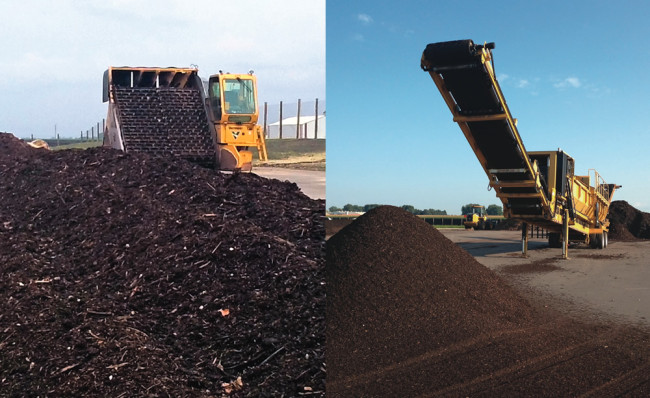
Composting at the Good Thunder facility is done in windrows that are turned with a Vermeer elevating face unit (left). Screened compost is sold to area landscapers (right).
The facility has been processing between 60 and 90 tons/week of SSO. When Milinkovich began meeting with area haulers about delivering organics to the Good Thunder facility, he encountered “some hesitancy.” As a result, the company began doing its own pick ups from area businesses, offering customers 64-gallon containers for their organics, and using a van-truck with a lift on the back to empty the carts. Full carts are exchanged with clean ones at every pick up. Customers range from grocery stores, restaurants, coffee shops and local events to entire school districts and hospitals. While attempts to convince local haulers to participate is gaining “some traction,” Milinkovich plans to expand his own collection activity in the coming months. He has a hauling license that covers an eight county area, and anticipates adding several more trucks and more organic waste containers.
One of Full Circle Organics’ key employees is Doug Johnson, who acquired valuable expertise in his previous position developing and managing the CreekSide Soils composting and mulch operation for the city of Hutchinson, Minnesota. “Doug managed a wide range of materials for Creekside,” says Milinkovich, who also has three other full-time and two-part-time employees.
On The Horizon
Interestingly, it took Full Circle Organics more than two years to get the Good Thunder facility permitted, compared to only about nine months for the Iowa operation, notes Milinkovich. The primary difference, he says, was a more complex and extensive public comment process. “Next time” will be easier, he adds. “Because we were the first privately owned and operated company trying to compost source separated organics in an open-windrow facility in Minnesota, there was no history of success stories to show us how to do it. The next facility I build should be a totally different story, because we’ll have something to use as a reference point for what is required.”
The state of Minnesota is close to finalizing revisions to its composting regulations, which currently require an asphalt or concrete pad, tipping building and collection pond for mixed waste and source separated food waste composting. But even if the state makes its regulations less stringent, Full Circle Organics plans to continue building its facilities to the highest MSW permit standard, Milinkovich notes. “We see the benefit of having an asphalt pad — we can get on the windrows 365 days with no weather constraints, such as heavy rain, which can be a problem using clay or gravel-based pads.”
Dan Emerson is a Contributing Editor to BioCycle.


